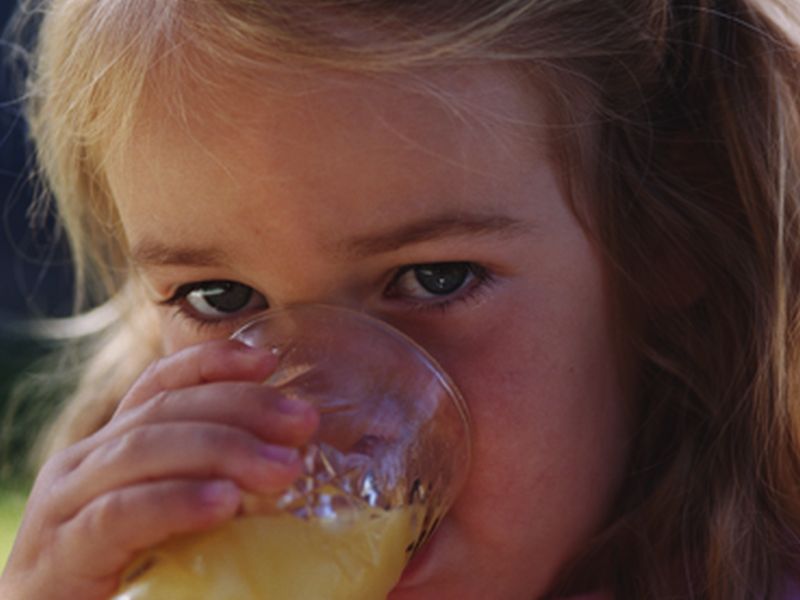
Thursday, March 24, 2016

THURSDAY, March 24, 2016 (HealthDay News) -- Many commercially sold fruit drinks and juices give kids a full day's worth of sugar in a single serving, a new British study shows.
One U.S. expert said she wasn't surprised by the finding.
"I believe the results would be very similar if this study was conducted with fruit drink products available in the United States," said Pamela Koch, executive director of the nutrition program at Teachers College, Columbia University, in New York City.
"Many fruit drinks are excessively high in added sugars, as this study found. Yet, these are often marketed as healthful products, confusing parents and children," she said.
The British study was led by Simon Capewell, a professor at the Institute of Psychology, Health and Society at the University of Liverpool. His team calculated levels of "free" sugars in 200-milliliter sizes (nearly 7 ounces) of 203 fruit drinks, 100 percent natural juices and smoothies marketed specifically to children.
Free sugars include those added to products -- such as glucose, fructose, sucrose and table sugar -- as well as naturally occurring sugars in honey, syrups, fruit juices and fruit juice concentrates. Naturally occurring sugars in whole fruits and vegetables are not free sugars.
Nearly half of the children's products in the study had at least a child's entire daily recommended maximum sugar intake of 19 grams (five teaspoons) of sugar, the researchers report.
In a university news release, Capewell said that as parents learn more about the high sugar content of sodas and other sweetened drinks, many "opt for seemingly healthier fruit juice and smoothie alternatives."
"Unfortunately, our research shows that these parents have been misled," he said. "The sugar content of the fruit drinks, including natural fruit juices and smoothies tested, is unacceptably high. And smoothies are among the worst offenders."
The solution? When possible, parents should give children fresh fruit instead of fruit juice, Capewell said. When giving children fruit juice, choose unsweetened juice, dilute juice with water, only serve it during meals, and limit the amount to 150 ml (about 5 ounces) a day, the researchers recommended.
In the meantime, "manufacturers should stop adding unnecessary amounts of sugars, and therefore calories, to their fruit drink/juice/smoothie products," Capewell said.
However, a group representing makers of 100 percent fruit juices took issue with the findings.
"Parents should feel good about serving 100 percent juice to their children in appropriate amounts as a body of research shows drinking 100% juice is not associated with dental [cavities] in early childhood and in fact, some studies show greater frequency of juice drinking may even have a protective effect on dental health in children," the U.S.-based Juice Products Association said in a statement.
"Weight is also not an issue, as a systematic scientific review of the evidence found drinking appropriate amounts of 100 percent juice is not associated with weight status or obesity in children," the group said.
Nancy Copperman, a nutritionist and assistant vice president of public health at Northwell Health in Great Neck, N.Y., begged to differ. She agreed with the study authors that the excessive amounts of "empty calories" in fruit drinks and juices is a problem that "crosses continents."
"The 2015 U.S. Dietary Guidelines recommends limiting added sugars to less than 10 percent of children's total calories and promotes eating fruit, rather than drinking 100 percent juice, to meet the suggested daily servings of fruits and vegetables," Copperman said.
She did make one distinction, however.
"In this study, the sugar content of 100 percent juices were higher than juice drinks. However, the sugar in the pure juice was from the naturally occurring form of sugars found in fruit," Copperman said. "Fruit drinks and smoothies contained added sugars -- such as high fructose corn syrup -- which are not naturally present in fruit or fruit juices and significantly add to empty calories."
The study was published March 24 in the online journal BMJ Open.
SOURCES: Pamela Koch, Ed.D., R.D., executive director, Laurie M. Tisch Center for Food, Education & Policy Program in Nutrition, Teachers College, Columbia University, New York City; Nancy Copperman, M.S.,R.D., assistant vice president, public health, Office of Strategic Planning, Northwell Health, Great Neck, N.Y.; statement, March 24, 2016, Juice Products Association; University of Liverpool, news release, March 23, 2016
HealthDay
Copyright (c) 2016 HealthDay. All rights reserved.
- More Health News on:
- Carbohydrates
- Child Nutrition









































No hay comentarios:
Publicar un comentario